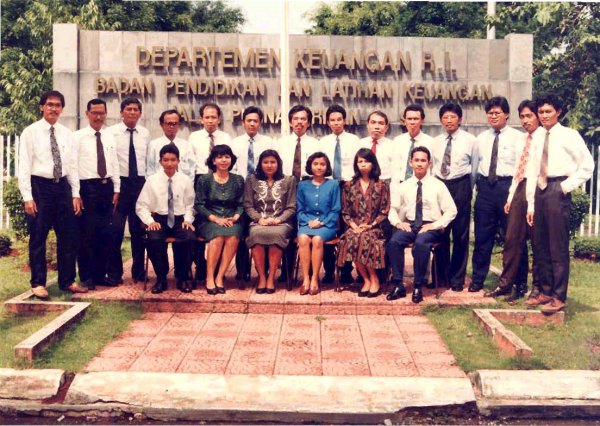Women in the Ministry of Finance face significant obstacles to advancement
Paramita Muljono
Women at the Ministry of Finance in 1992: outnumbered, surrounded, and not yet standing up. Not much changed in 2007.
|
In 2005, for the first time, a woman was appointed as Indonesia’s Minister of Finance. While only four out of 33 ministries are headed by women, this has at least shown that women are now getting more than just the Women’s Affairs portfolio. Almost no other finance ministry in a developing country has a woman in charge. So does the Ministry of Finance provide fair opportunities to its female workers, setting an example for the rest of the civil service, the private sector and society in general? On the contrary, women still suffer discrimination in hiring and promotions, and recent reforms may have made matters even worse.
Women need not apply
The Ministry of Finance (MOF) currently employs over 62,000 people. However only one fifth of these employees are women. The problem is not that qualified women are not applying, but that qualified women are not being accepted. MOF officials say that this is because it is difficult to send women to remote areas when they are single, and almost impossible once they are married.
Hiring and promotions for the MOF are managed by the central government in Jakarta. Indeed, the whole Ministry remains under the control of the central government, unlike many other ministries which were decentralised after 1999. The MOF recruits high school graduates into its own State Accounting College (STAN), paying for their education and then hiring them after they graduate. Consequently, STAN aims to admit exactly as many students as the MOF will need to employ. Last year 2207 men and only 461 women were accepted into STAN, out of a total of over 120,000 applicants. The low number of women accepted was not, however, because men outperformed them on the entrance exam.
Even though civil service regulations forbid discrimination based on race, religious beliefs or gender in the recruitment process, such discrimination occurs as a matter of policy. One member of the MOF recruitment committee told me that many women were sufficiently qualified, but that the offices (directorate generals) within the ministry were only willing to admit a total of 461 women. Consequently, STAN compiled a ranked list of results on the entrance exam, and then selected the top 2207 men and the top 461 women from that list.
‘The Customs Office has recruited no women at all for the past decade’
Some MOF offices which have branches all over Indonesia, such as the Tax Office, Budget Office, and the Treasury, apply particularly small quotas on how many women they hire. The most blatant example is the Customs and Excise Office, which has succeeded in recruiting no women at all for the past decade. Parliament has told the MOF to stop applying these quotas, and questioned the Minister of Finance over the policy, given that gender reforms normally use minimum quotas for women not maximum ones. This situation is especially ironic considering that the current Finance Minister is a woman who professes concern about gender issues.
The quota system means that those women who are hired tend to have better marks than most men. A senior MOF official once admitted that ‘even though the MOF has a very limited number of women, these women are the best people we have because they have been filtered using a tighter filter than their male colleagues.’ We might then expect that these ‘best people’ would excel in their careers, going on to occupy the top managerial levels. But this has not happened.
Glass ceiling
Women occupy about a quarter of the total managerial positions in the MOF. Considering that they make up only 20 per cent of MOF employees, we might conclude that they are well represented in management. Yet closer examination reveals that women are concentrated in the lowest managerial levels. Currently there are no women at echelon I level (head of an office) and only nine at echelon II level (director of unit) compared to 152 men in the same positions.
The civil service tends to be a lifetime career, from graduation until retirement (at 56). Civil servants rarely quit or get fired, and seldom move from one ministry to another. Their career paths are based on both their grades and position. Grades range from I/a (the lowest) to IV/e (the highest), and determine wage level. Positions are categorised as either support staff or management, with management then rated from echelon IV (the lowest) to echelon I (the highest). If an employee’s performance is deemed satisfactory their grade will advance once every four years. Rises in grade do not, however, guarantee promotions to better managerial positions.
How are promotions determined? All civil servants undergo a standard performance assessment (DP3) every year, which was created during the Suharto regime and emphases, among other things, loyalty to Pancasila (the official ideology of the state) and the Constitution. For the past decade, the MOF has used additional work performance indicators to complement the DP3. While these additional measures provide a more accurate assessment of an employee’s performance – and therefore of their eligibility for promotion - the assessment nevertheless remains open to discretion and bias. It is handled by a single supervisor, rather than a comprehensive review with a wider team. If a particular supervisor does not happen to like you or does not rate you highly for whatever reason, he or she is fully entitled to use any of the hundreds of civil service regulations and ignore the others in making their assessments. This record will then stand for the rest of your career. Since the great majority of supervisors are male, and since they tend to have a limited regard for their female colleagues’ capabilities, women employees are particularly vulnerable in this process.
Tours of duty
The Ministry of Finance has branches down to the district level throughout Indonesia, and as civil servants, all employees have to sign a statement that they are willing to be posted anywhere in the country. Postings outside of Java are less popular than those in Java, for a couple of reasons. The outer regions are less developed and many people prefer to live in Java with its better services. Also, the higher quality of education in Java means that more Javanese people are hired, and want to work near their homes. Promotions are used as incentives to accept remote postings; turning down the ‘tour of duty’ means losing the promotion. This situation further disadvantages women in several ways. The situation is complex because policies on relocating female employees vary between MOF offices, and there is considerable discretion in deciding placements. For example, the Customs and Excise Office tends to keep its few female employees in administrative positions in big cities on Java.
For employees of the Tax Office, postings outside Jakarta are actually sought-after when the region involved contains large, profitable companies, because opportunities for the corruption of tax funds will be higher. Women are usually denied these more lucrative postings for several reasons. They are perceived as less able to conduct difficult tax negotiations and less disposed to engage in collusion. It is assumed that they are not a family’s main breadwinner, and therefore less in need of unofficial payments. Being denied these opportunities can then restrict their future careers.
‘Prospects for upward mobility are distinctly limited’
A human resources official from the Tax Office said that small offices in remote regions were seen as ‘unsafe for women’. He told me that women tend to turn down promotions which are attached to remote postings, preferring to stay in Jakarta, or at least Java. One of my informants, a female mid-level manager, strongly disagreed with these views, claiming that postings were not even offered to women, and that the men were just using this kind of reasoning to protect their jobs. Since women cannot be promoted without serving in remote areas, their grade advances while their position remains low. The result is that the Jakarta office is filled with women in advanced grades but low positions: the Tax Office currently has no women in echelon II.
The Treasury Office has a gender-aware (and female) human resources manager. Some women have made it into upper management, with four women in their 32 echelon II positions. All four women achieved their promotions by accepting remote postings, and are currently based outside Java. However, three of the four women are divorced or widowed, showing that it remains difficult for women with families to advance.
The MOF allows women to seek re-assignment to accompany their husbands when they are assigned to another city. While this suggests flexibility towards women’s careers, the ‘beneficiaries’ must accept demotion to a sub-managerial level in their new posting. This flexibility is not offered to men, which means that it is invariably the women who are required to accept demotion in order to accompany their husbands.
More generally, decisions about promotions are often made for women in paternalistic ways. One colleague I interviewed, Tanti, holds a middle management position, and her husband is the director of a MOF office in Jakarta. Tanti has been given several positions at the same level in and near Jakarta, but has been passed over for every promotion. Rather than her husband’s position helping her advance, she is convinced that her HR manager is hesitant to move her away from her husband, and thus she is not offered promotions to remote postings.
Reform?
The way discretion works in the civil service may offer some advantages for women in terms of flexibility and security, but it also restricts their opportunities to compete with male colleagues on an equal basis. In other words, life for female civil servants may be ‘safe’, but prospects for upward mobility are distinctly limited.
In July 2007, parliament approved a US$170 million bureaucratic reform program for the MOF. The reform includes measures to improve human resources management, including assessment and placements. However, the reform has no specific gender-related goals, meaning that women are not about to see their fortunes improve. Ironically, the reverse may be true. For example, there has been a recent push within the Tax Office to improve their corruption-tainted image. One initiative designed to achieve this has been to channel women into public relations and administrative jobs, where their image of being ‘clean and respectable, free from KKN (corruption, collusion, and nepotism)’ will give the Tax Office a ‘cleaner face’. The effect has been that men are given the more technical positions, while some women with Masters degrees in tax auditing are pushed into PR work. Thus ‘image reform’ is undertaken at the price of removing women from their areas of expertise and stunting their careers.
Gender discrimination, although prohibited, is still a semi-official part of MOF hiring practices. When women do get hired, they still face significant hurdles in obtaining promotions, meaning that women tend to occupy the lower positions in the ministry. Clearly much work remains to be done if women are to have equal opportunities. ii
Paramita Muljono (p.muljono@uea.ac.uk ) is a PhD student at the School of Development Studies, University of East Anglia, and a former employee of the Ministry of Finance.












